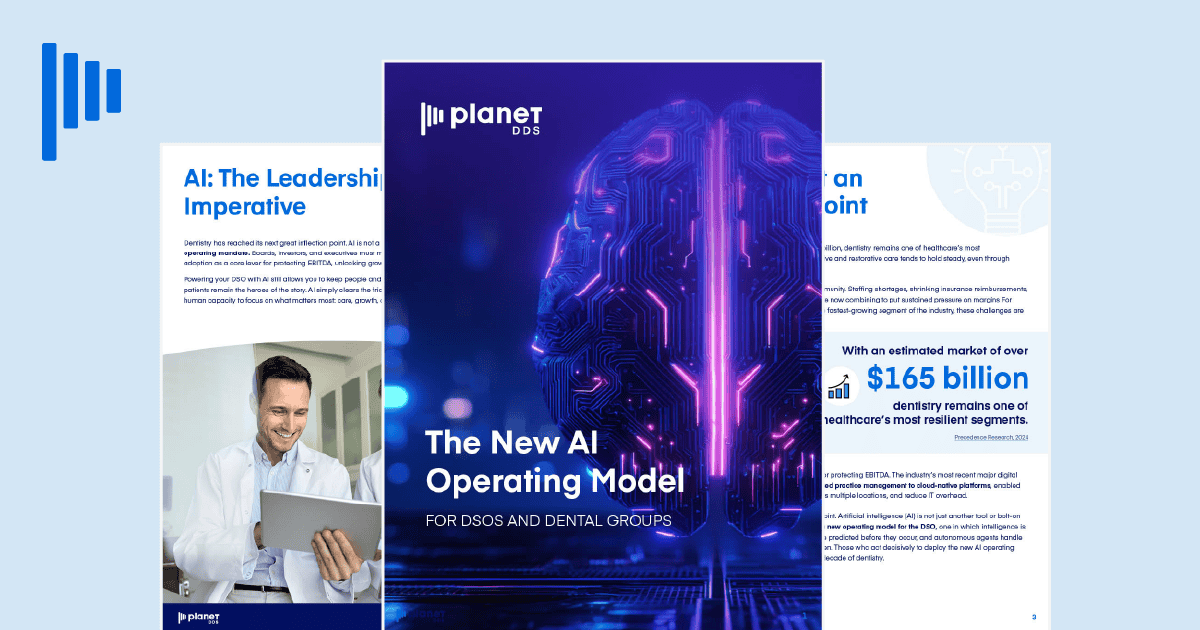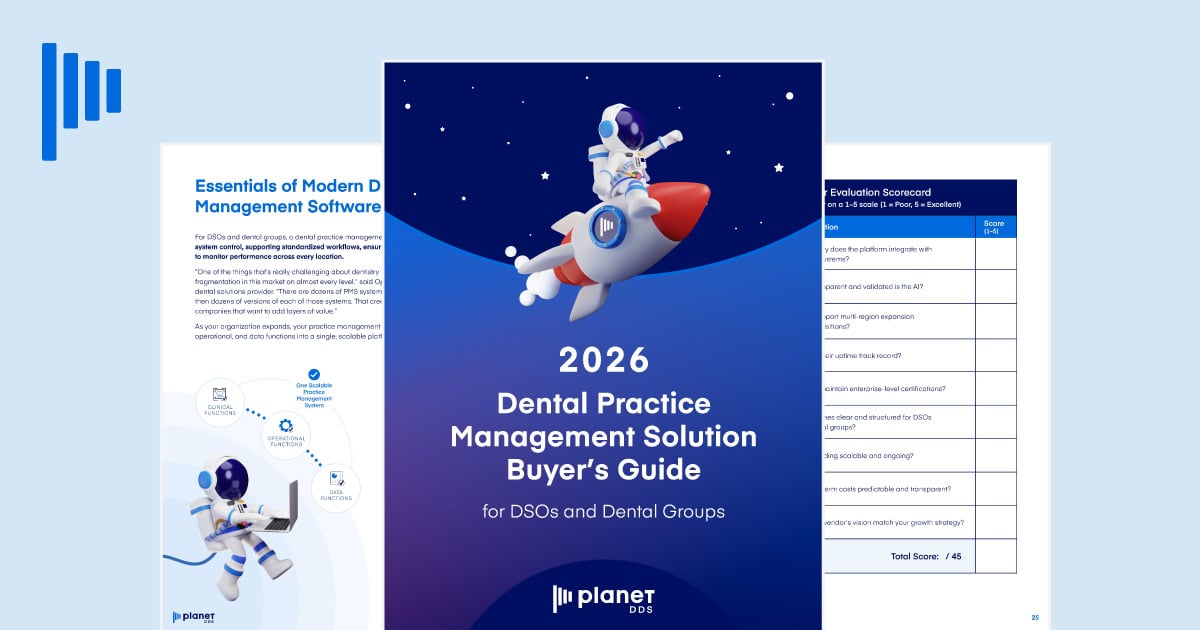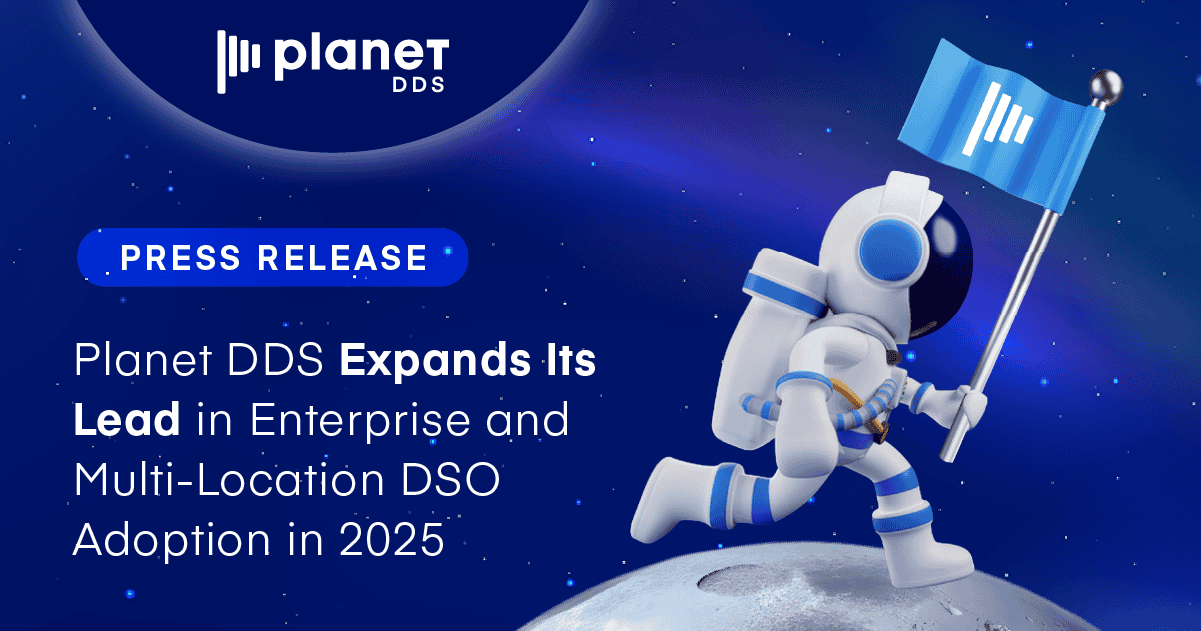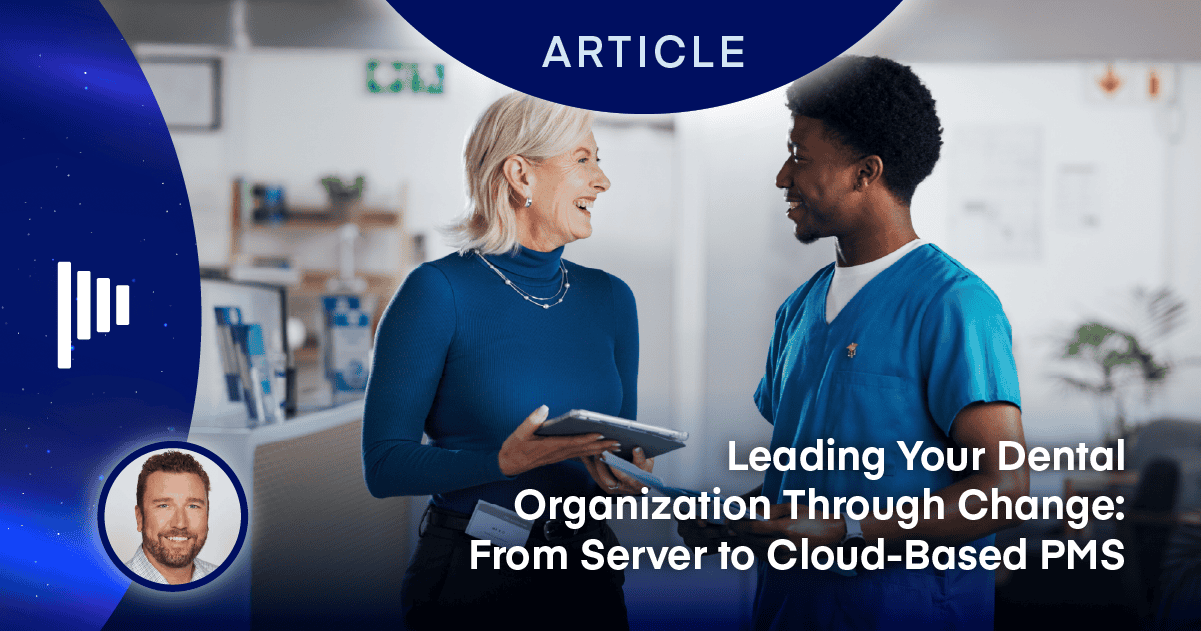The New AI Operating Model for DSOs and Dental Groups

Dentistry has reached an inflection point. With more than $165 billion in annual value at stake, dental support organizations (DSOs) and dental groups face rising costs, shrinking reimbursements, and mounting operational complexity. Technology has helped DSOs protect EBITDA, with the shift from server-based systems to cloud-based platforms enabling faster scale, greater visibility, and lower IT overhead.
Now, artificial intelligence represents the next leap forward: a new operating model where intelligence is built into workflows, agents handle routine tasks, and enterprise value is strengthened across every aspect of the business.
This guide highlights how DSOs and dental groups can prepare for AI adoption to position their organizations for innovation and sustainable growth.
Dentistry at an Inflection Point
Despite resilience through past downturns, dentistry now faces sustained margin pressures. For DSOs, inefficiencies like slowed collections, insurance complexity, and turnover directly impact EBITDA and enterprise value. AI marks the shift to a new operating model that is redefining how DSOs function and grow.
Lessons from Other Industries
AI leaders in other sectors succeed by treating it as a business-wide shift, not isolated pilots. They:
- Embed AI into workflows rather than layering it on top.
- Tie success directly to outcomes such as EBITDA growth and resilience.
- Build organizational readiness with governance, training, and adoption culture.
For DSOs, the lesson is clear: embedding AI into the operating model is the only way to unlock true enterprise value.
Dentistry’s Unique AI Opportunity
Dentistry holds two major advantages:
- Fragmented legacy systems have created process debt. AI can eliminate inefficiencies caused by disconnected PMS, revenue cycle management (RCM), and imaging platforms.
- Underused data—from claims to clinical imagery—remains siloed. DSOs that unify and harness this information with AI can generate cross-functional value that compounds with every patient interaction.
Maturity Path: From Assistance to Autonomy
AI adoption will progress in stages:
- Assist: Automating repetitive tasks like claim attachments and reminders
- Advise: Delivering predictive insights into patients, production, and performance
- Act: Operating autonomously, rescheduling patients, pursuing unpaid claims, and dynamically managing staffing
Each stage builds workforce trust while generating ROI that funds the next.
The AI Workforce Model
Rather than a single “copilot,” DSOs need an orchestrated workforce of AI agents:
- Scheduling agents optimize chair time.
- RCM agents automate claims, payments, and collections.
- Communication agents manage patient outreach.
- Marketing agents strengthen campaigns and reputation.
- Quality assurance and overwatch agents safeguard accuracy and coordination.
The result is not staff replacement but a re-architecture of processes. AI removes drudgery while humans focus on growth and care.
The Economic Impact of AI in Dentistry
AI strengthens every part of the EBITDA equation:
- Revenue cycle: Automation reduces the 2.9% of production typically lost to insurance errors—worth millions annually to large DSOs.
- Labor efficiency: Agentic AI automates repetitive work, reducing staffing pressure while preserving margins.
- Top-line growth: AI boosts treatment acceptance and reduces no-shows by up to 40 percent.
- Bottom-line savings: Workflow automation cuts overhead and IT costs.
- Enterprise value: AI modernization reverses valuation discounts tied to fragmented infrastructure.
Roadblocks to Adoption
DSOs must overcome four main challenges: fragmented tech stacks, workforce skepticism, compliance concerns, and ethical or regulatory questions. The leaders will address these head-on through standardization, transparency, training, and governance.
Preparing Your DSO for AI
Success requires enterprise transformation across four enablers:
- Modern data and technology infrastructure.
- Redesigned workflows with AI embedded.
- A culture of collaboration and training.
- Clear governance and ethics frameworks.
Best practices include forming governance councils, developing ROI-based playbooks, and communicating the “why” of AI adoption.
The AI Horizon in Dentistry
The AI horizon in dentistry reflects the stages of adoption, with near-term applications already emerging and mid-term capabilities reshaping core operations:
- Near term (12 to 24 months): Early agents in RCM and scheduling, conversational AI for executives, and measurable EBITDA impact
- Mid-term (3 to 5 years): Autonomous workflows, leaner staffing models, predictive patient personalization, and embedded compliance.
DSOs who adopt AI will become predictive and resilient, while laggards risk declining valuations.
AI: A Leadership Imperative
AI is now a strategic mandate. Boards, executives, and investors must drive adoption as a core lever for growth, resilience, and enterprise value. At its best, AI amplifies human capacity, empowering staff to focus on patient experience and organizational growth.
Where We’re Taking AI in Dentistry
Planet DDS is building more than bolt-on tools. DentalOS™ with AI delivers a platform-level foundation where intelligence flows across the enterprise.
- Operational intelligence keeps executives connected to real-time performance.
- Agentic workforces handle revenue cycle tasks, scheduling, and patient engagement, freeing staff for higher-value work.
Our mission: not just efficiency, but durable operating advantage that improves EBITDA today and sets DSOs up for tomorrow.
Shaping the AI Future for DSOs
The AI shift is already under way. DSOs that modernize infrastructure, embed agents, and prepare their workforce will lead the next decade of dentistry. With DentalOS and Planet DDS, organizations can transform their operations into AI-native enterprises built for scale, resilience, and growth.
Ready to explore AI-driven dentistry? Contact us today.



